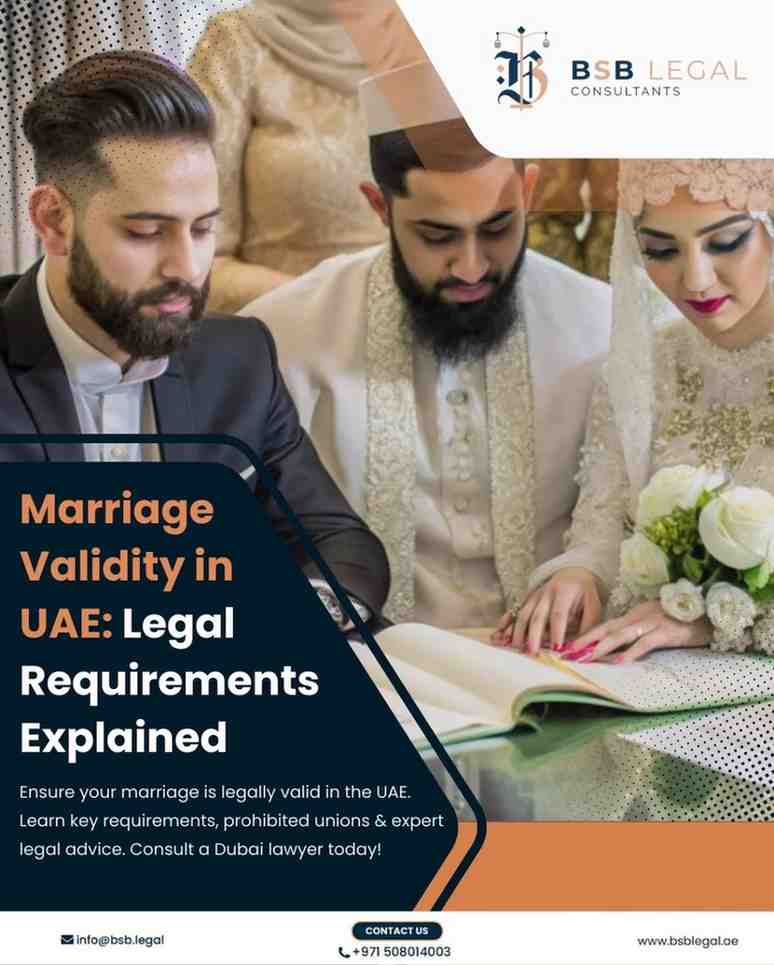


Ensure your marriage Validity in UAE. Learn key requirements, prohibited unions & expert legal advice. Consult a Dubai lawyer today!
Getting married is one of life’s most significant milestones. Beyond the celebration, an essential legal aspect to marriage validity in UAE often goes unnoticed. Before tying the knot, it’s important to understand the legal requirements that make your marriage valid in the eyes of the law. This knowledge ensures that your marriage is not only recognized but also protects both parties’ rights.
Whether you’re planning a wedding soon or simply curious, this blog will help you out.
Elements of a Marriage Contract
A valid marriage contract hinges on three fundamental elements:
The Contracting Parties: The husband and the wife’s guardian play critical roles. The guardian, typically a male relative, must agree to the marriage on behalf of the bride.
The Object refers to the marriage itself—the mutual intention of both parties to enter into a matrimonial relationship.
Proposal and Acceptance: This involves a clear offer of marriage from one party and acceptance by the other, all conducted within a legal framework.
These elements form the foundation of a valid marriage contract. If any of these are missing, the agreement could be deemed invalid.
The Role of the Guardian
The guardian’s role is vital in some legal systems, particularly those influenced by Islamic law. Article 39 specifies that a major woman’s guardian must conclude her marriage validity in UAE contract with her consent. If a marriage is conducted without a guardian, it’s considered invalid, even if the marriage has been consummated. The spouses must be separated in such cases, although the child’s filiation will still be recognized.
Conditions for a Valid Marriage
To ensure that a marriage is valid, certain conditions must be met, especially during the proposal and acceptance stage :
Clear Communication: The proposal and acceptance must be expressed verbally using marriage-specific terms. This verbal exchange confirms that both parties intend to marry.
Binding Agreement: The proposal and acceptance must be binding, not dependent on future conditions or temporary arrangements. Marriages based on uncertain conditions or for temporary enjoyment are not considered valid.
Mutual Understanding: Both parties must understand the terms and intend for them to lead to marriage. The intent must be clear even if they don’t fully grasp the exact words.
The contract is not valid if these conditions are not strictly followed. For instance, if one party withdraws the proposal before acceptance, the contract is void.
Prohibited Marriages
Certain relationships are prohibited by family law, either permanently or temporarily, as detailed in Articles 42-47 of Federal Law No. (28) of 2005 Regarding Personal Status. These prohibitions are crucial to ensure that marriages are legally and ethically sound.
Permanently Prohibited Women
A man cannot marry women related to him by blood, such as:
His ancestors or descendants.
The descendants of his parents or grandparents.
This rule prevents marriages that would breach close familial bonds.
Conclusion
By being aware of these essential elements, conditions, and prohibitions, couples can ensure marriage validity in UAE and that both parties’ rights are protected. In short, family laws ensure that both parties meet their obligations. If you’re unsure about the legality surrounding family laws, consulting with a legal expert or a Dubai Lawyer can provide the clarity you need to keep your rights intact. Reach out to top law firms in Dubai that can help you out.
